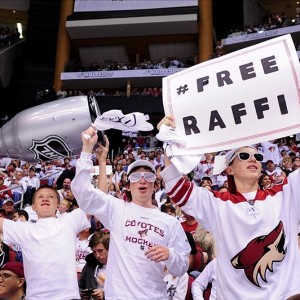On October 5th, the National Hockey League’s Department of Player Safety made an immense announcement.
San Jose Sharks forward Raffi Torres, known throughout the NHL exclusively for his lengthy history of warnings, fines and suspensions, was officially suspended by the League for 41 games. The half season ban comes as the result of a hit to the head of Anaheim Ducks forward Jakob Silfverberg, which occurred on Saturday, October 3rd, the Sharks’ final game of the pre-season.
San Jose’s Raffi Torres has been suspended 41 games for an illegal check to the head and interference. Video: http://t.co/0Z9kgVAMyq
— NHL Player Safety (@NHLPlayerSafety) October 5, 2015
The 41 game suspension is the longest in NHL history, surpassing the 30 game ban awarded to Chris Simon for a stomping incident in the winter of 2007.
Disciplinary History
Torres is well-known throughout the NHL for his lack of discipline, as he has received three fines, two warnings, and now, a total of five suspensions throughout his career.
In 2011, Torres received his first suspension, an illegal hit to the head of Edmonton Oilers forward Jordan Eberle, receiving a four-game suspension.
In 2012, Torres received his second suspension, this time for a charge as well as hit to the head of the Minnesota Wild’s Nate Prosser. The two-game ban was his second consecutive for an illegal check to the head. Further in 2012, Torres was suspended once again, this time for 25 games following a late hit delivered to Marian Hossa, who left the game on a stretcher and missed the remainder of the season.
The following season, 2013, Torres was once again suspended for an illegal check to the head, this time on Jarret Stoll of the Los Angeles Kings. Considered a repeat offender, Torres was banned for the remainder of the San Jose Sharks’ playoff series.
Based on his disciplinary history, a common pattern emerges in Torres’ play, the repeated tendency to target the head, a decision on Torres’ part which risks significant injury to opposing players.
However, to date, the NHL has seemingly been reluctant to award substantial suspensions, typically preferring to hand out bans of two to five games on average, depending on the severity of a given instance.
Torres Suspension Has Its Benefits

Believe it or not, the massive suspension given to Torres does bring benefit to the NHL.
Although there is quite obviously a negative connotation associated with the NHL in issuing such a significant ban, one major positive emerges, and that is the clear shift in thinking on the part of the NHL and the Department of Player Safety.
In the past, most bans relative to illegal checks to the head fell in the two to five game range, as previously mentioned. Last year, there were a total of nine suspensions resulting from hits to the head. The fewest number of games banned in such instances were given to both Keith Aulie and Marco Scandella, who each received two-game suspensions. On the other hand, the longest ban given last year for such a hit was five games, as John Moore was suspended for a hit to the head of Erik Haula.
However, suspending Torres for an NHL record 41 games indicates that a renewed emphasis has been placed on player safety by the NHL. In reality, a two or five game suspension represents a mere fraction of an NHL season, and is less than sufficient in ensuring a player will not repeat an illegal action. However, a 41 game suspension, or half the season, is much more sufficient, illustrating to the players of the NHL that illegal and dangerous hits to the head will no longer be tolerated.
Of course Torres’ lengthy disciplinary history undoubtedly came into play when coming to this ground breaking decision, however, this suspension can and most certainly should be used by the NHL as a stepping stone in a new direction, as more hefty suspensions related to illegal activities will deter not only the occurence of such plays, but also the quantity of repeat offenders.

There is no doubt that such illegal plays will continue to occur, however, the threat of a much more substantial suspension will undoubtedly be in the minds of all players when finishing select hits or engaging in related physical plays. As a result, if the Department of Player Safety maintains this high level of discipline on incredibly dangerous hits to the head, as they should, the opportunity presents itself for the NHL to significantly cut down not only on suspensions, but also injuries and most notoriously, concussions.
Creating a much safer, legal game will allow both the NHL and the game of hockey itself to grow and gain appeal worldwide as not only the fastest game on ice, but also an intelligent and calculated one. All in all, the Torres suspension provides the NHL with the opportunity to change not only the NHL game and its players itself, but also the perception of the game of hockey worldwide.